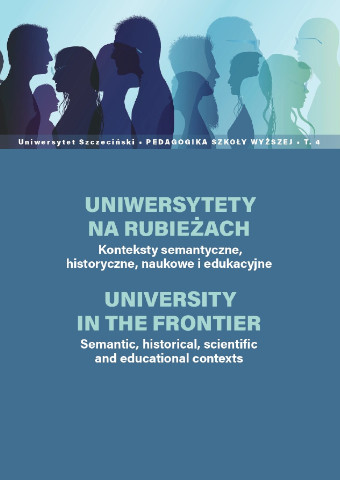
ISBN: 978-83-7972-559-5
ISBN (online): 978-83-7972-560-1
ISSN: 2083-4381
OAI


Issue archive /
T. 4
Cross-border cooperation of students in developing their social competencies
| Authors: |
Monika
Zięciak

University of Szczecin |
| Keywords: | social competencies students of pedagogy international cooperation |
| Data publikacji całości: | 2022 |
| Page range: | 10 (461-470) |
Abstract
The aim of the research presented in the article was to determine to what extent the activities undertaken by students of pedagogy in an international project differentiated the level of their social competencies. The method applied in the research was a diagnostic survey using a standardised tool by A. Matczak – the Social Competence Questionnaire. The first measurement of social competencies of the pedagogy students participating in the project was conducted in November 2020 and involved a group of 12 second year pedagogy female students, specialisation: care and re-socialisation. The evaluation study took place in October 2021, i.e. after a year during which the respondents performed various social activities. The project entitled: ‘Crisis as a challenge – strategies for training to cope in cross-border teacher education as a contribution to stabilising the situation in the Region’ was carried out in cooperation with the University of Greifswald and included various workshops and activities, e.g. hippo therapy, classes to develop emotional intelligence, workshops teaching to cope in crisis situations, photography labs, art classes and many others. However, it should be noted that the entire programme of the project was carried out during a time of crisis, the Covid-19 pandemic, when university education took place remotely and the face-to-face contact was more difficult. The achieved results are an indication that the changes in the level of social competencies of the female students participating in the project are not statistically significant. The impacts exerted on the female participants did not increase their social competencies.
Download file
Article file
Bibliography
| 1. | Argyle, M. (2001). Psychologia stosunków międzyludzkich. Tłum. W. Domachowski. Warszawa: Wydawnictwo Naukowe PWN. |
| 2. | Argyle, M. (1998). Psychologia stosunków międzyludzkich. Warszawa: Wydawnictwo Naukowe PWN. |
| 3. | Bąbka, J. (2020). O potrzebie zmian w zakresie kształtowania kompetencji społecznych studentów pedagogiki. Rocznik Lubuski, 1 (46), 63–74. |
| 4. | Bobrowska–Jabłońska, K. (2003). Znaczenie inteligencji emocjonalnej i kompetencji społecznych w kształceniu w SGH – raport z badań. E-mentor, 2. Pobrane z: https:// www.e-mentor.edu.pl/artykul/index/numer/2/id/17 (10.07.2022). |
| 5. | Espelage, D.L., Low, S., Polanin, J.R., Brown, E.C. (2013). The impact of a middle school program to reduce aggression, victimization, and sexual violence. Journal of Adolescent Health, 53 (2), 180–186. |
| 6. | Frost, D.E. (2003). The Psychological Assessment of emotional intelligence. W: J.C. Thomas, M. Hersen, (red.), Comprehensive handbook of Psychological Assessment (s. 203– 215). New Jersey: Jon Wiley and Sons Inc. |
| 7. | Goleman, D. (1999). Inteligencja emocjonalna w praktyce. Tłum. A. Jankowski. Poznań: Media Rodzina. |
| 8. | Hłobił, A. (2021). Kompetencje społeczne podstawą potencjału zawodowego nauczycieli. Disputationes Scientificae Universitatis Catholicae in Ružomberok, 3, 41–50. Pobrane z: social-competences-as-the-basis-of-teachers-professional-potential_Content File- -PDF.pdf (ceeol.com) (12.07.2022). |
| 9. | Hubbard, J.A., Coie, J.D. (2001). Emotional correlates of social competence in children’s peer relationship. Pobrane z: www.udel.edu/psych/fingerle/article1.html (11.07.2022). |
| 10. | Jagiełło-Rusiłowski, A. Solarczyk-Szewc, H. (2013). Kwerenda badań nas kompetencjami społecznymi w kontekście edukacji akademickiej w Polsce i na świecie. Przegląd Badań Edukacyjnych, 2 (17), 27–50. |
| 11. | Kaya, F., Buzlu, S. (2016). Effects of Aggression Replacement Training on problem solving, anger and aggressive behaviour among adolescents with criminal attempts in Turkey: A quasi-experimental study. Archives of Psychiatric Nursing, 30 (6), 729–735. |
| 12. | Martowska, K. (2012). Psychologiczne uwarunkowania kompetencji społecznych. Warszawa: Liberi Liberi. |
| 13. | Mascovici, S. (red.) (1998). Zdolności społeczne, Psychologia społeczna w relacji Ja – Inni. Tłum. M. Cielecki. Warszawa: WSiP. |
| 14. | Matczak, A. (2001). Kwestionariusz Kompetencji Społecznych. Podręcznik. Warszawa: Pracownia Testów Psychologicznych PTP. |
| 15. | Matczak, A. (2005). Uwarunkowania inteligencji emocjonalnej i kompetencji społecznych- -emocjonalnych. Raport końcowy z realizacji projektu 2 H01 F 062 23 w latach 2002– 2005. Warszawa, tekst niepublikowany. |
| 16. | Piorunek, M., Werner I. (2017). Kompetencje społeczne nauczycieli – diagnoza i pomocowe implikacje. Studia Edukacyjne, 44, 121–142. |
| 17. | Sanecki, G. (2013). Postrzeganie własnych kompetencji zawodowych przez studentów pedagogiki UMCS. Rocznik Andragogiczny, 20, 75–90. |
| 18. | Smółka, P. (2016). Osobowościowe uwarunkowania efektywnego funkcjonowania w sytuacjach społecznej ekspozycji. Niepublikowana rozprawa doktorska. Warszawa: Wydział Psychologii, Uniwersytet Warszawki. |
| 19. | Sukhodolsky, D.G., Smith, S.D., McCauley, S.A., Ibrahim, K., Piasecka, J.B. (2016). Behavioral Interventions for Anger, Irritability, and Aggression in Children and Adolescents. J Child Adolescent Psychopharmacol, 26 (1), 58– 64. |
| 20. | Twardowska-Staszek, E., Alberska, M. (2020). Inteligencja emocjonalna i kompetencje społeczne nauczycieli szkół specjalnych. Studia Paedagogica Ignatiana, 4, 111–134. Pobrane z: emotional-intelligence-and-social-competences-of-special-school-teachers_ Content File-PDF.pdf (ceeol.com) (12.07.2022). |
| 21. | Vahedi, S., Fathiazar, E., Hosseini-Nasab, D., Moghaddam,M., Kiani, A. (2007). The Effect of Social Skills Training on Decreasing the Aggression of Pre-school Children. Iranian J Psychiatric, 2 (3), 108–114. |
| 22. | Wierzejska, J. (2015). Kompetencje społeczne absolwentów studiów pedagogicznych. W: K. Denek, A. Kamińska, P. Oleśniewicz (red.), Edukacja jutra. Kształcenie osób dorosłych. Aktywność w życiu zawodowym. Sosnowiec: Oficyna Wydawnicza Humanitas. |
| 23. | Wilson, S., Lipsey, M. (2005). The Effects of School-based Social Information Processing Interventions on Aggressive Behavior. 5. Vanderbilt University. |
| 24. | Wojnarska, A. (2008). Kompetencje społeczne studentów resocjalizacji. W: Z. Palak, A. Bujnowska (red.), Kompetencje pedagoga specjalnego. Aktualne wyzwania teorii i praktyki. Lublin: Uniwersytetu Marii Curie-Skłodowskiej. |
| 25. | Wojnarska, A. (2019). Uwarunkowania efektywności treningów umiejętności społecznych. Edukacja – Technika – Informatyka, 1 (27), 105–112. |